- Home
- Jessie Haas
Keeping Barney
Keeping Barney Read online
Keeping Barney
Barney, Book One
Jessie Haas
For Scamper, with thanks
Contents
(1)The Dream
(2)Barney
(3)Dramatic Entrance
(4)Bold Charger
(5)Escape!
(6)The Fall
(7)Explanations
(8)A Letter
(9)Missy
(10)Thanksgiving
(11)A Lesson
(12)The Hunter
(13)Dr. Raymond
(14)The Gift
(15)Christmas
(16)On Woodfield Mountain
(17)Prospects
Preview: A Horse Like Barney
(1)The Dream
As soon as the sun gets below the branch with the birds’ nests, I’ll go in and ask them, Sarah decided. And this time I’ll really do it. It was about the twentieth such decision she’d come to in the past hour.
The windows of the house stared at her like accusing eyes. She turned away from them, and wandered back through the barn. To her left, the empty haymow yawned darkly. Once it must have been heaped to the rafters with new-smelling hay; crossing her fingers, Sarah thought, Maybe it will be again, soon.
Before, the hay would have fed cows and huge, handsome draft horses. Their harnesses hung, cracked and dusty, on the wall, and in the back the handles of a plow reared up, skeletons from another time. What kind of horse would eat the hay she forked down into the manger? Gillian and Albert said he was half Morgan, but the other half might be anything.
She went down the stairs, pictures of what Barney might be shifting through her head. In her favorite, he was half Thoroughbred, tall, sleek and black, with only the extra power of his frame to show that he wasn’t purebred. She leaned over the door of the stall that was going to be—might be—his, imagining him there within. At the sound of her voice his head came up, and he trod, deliberate, powerful, and quick, to her. She greeted him with the murmuring language that only the two of them understood … and they whirled away across the countryside, hurtling over walls and gates, outracing even the deer … and the miles rolled away, spurned under the hooves of the valiant steed, who would race for her till his great heart burst. To calm him, she leaned forward and put a hand on his hot neck, saying only his name—
Barney. She didn’t have the Black Stallion, she had the prospect, maybe, of keeping a half-Morgan gelding named Barney for the winter, and it was time that she plucked up the courage to ask Mom and Dad. I’ll just go check the sun, she thought hopefully. Maybe there was still a minute or two … but of course, the sun was well below the branch with the nests, and she walked slowly across the yard to the house, heart thumping.
Star barked when she came in, and Sarah hushed her quickly. Mom was in the pantry, hunting for the bay leaves. They’d moved here three weeks ago, and there was still at least one essential thing missing at all times. Sarah didn’t see what difference one little bay leaf could make to a Hungarian goulash, but Mom had high standards about her cooking. I suppose this isn’t the time to ask, Sarah thought, seeing the irritated set of her lips.
The newspaper still lay on the table where she’d left it, open to the Classified Ads section. Wandering past it casually, Sarah saw her circled ad under Livestock, with a thud of the heart. It looked so obvious! Her face went hot, and she hurried upstairs to her own room, not wanting to be there when Mom finally noticed.
She got under the comforter to ward off the mid-September chill, and sat there, hugging her knees. Even through the bed she could feel the vibrations of Dad’s typing in the room below. I hope he’s happy, she thought, and immediately felt guilty at her own malice. All her life Dad had been writing, usually literary criticism, but finally, three years ago, his own long-planned novel. Incredibly, it had made money, and with it he and Mom had embarked on an old dream of theirs.
For the first time, Sarah learned that they owned a small farm in Vermont, left to Mom by her grandfather. When she demanded to know why they’d never told her, Mom seemed mildly shocked at her vehemence. “It was never a factor, dear. Your father’s work was here, the farm had tenants, and that was that.” But now, after giving suitable notice to Dad’s college, the school where Mom taught, and the farm’s tenants, they packed up their belongings and began the grand experiment. Dad was tired of sandwiching his writing in between everything else, Mom hated city life, and Sarah, more than anything else in the world, wanted a horse.
She gave the bed a discontented jounce. It wasn’t fair. Their dreams had come true, why shouldn’t hers? I wouldn’t forget to feed a horse, she whispered to herself. Why couldn’t they understand that? And why did they have to drag in all the undeniable financial reasons against having one? Now she couldn’t even resent the decision without feeling childish and self-centered. Nothing was fair!
She rolled over and bit the pillow, trying to think of a good opening. Would you let me have a horse if it didn’t cost anything? Mom, what did you think of this ad? I know how I could get a horse for a while, just to keep and use.… No, no, no. All those things sounded perfectly fine in her head, but she couldn’t imagine actually saying them. She’d have to play things by ear, and she hated that. By the time she’d gathered her courage to say anything, the perfect moment had always just passed.
She heard the clinking of plates from the kitchen—Mom was setting the table. Already she knew the sound of the new routine, how many steps Mom always took around the table: had she paused by the newspaper? She’d definitely paused, but Sarah couldn’t tell where. After a moment she moved on, once more to the stove, and then to the door of Dad’s writing room. Then the call up the stairs: “Sarah, supper!”
Dad came out of the room as she reached the bottom of the stairs, looking tired and dissatisfied. Sarah’s heart dropped. She followed him out to the kitchen, and heard Mom ask, “How is it going, George?”
“Slow.” Dad groaned, sinking into his chair. “Have to fight for every word.…” He rubbed his hands over his face. “I expected this for the first few days, Helen, but it’s been three weeks now!”
“You’re pushing too hard,” said Mom, filling his bowl with goulash. Star watched with bright, hopeful eyes.
“Don’t encourage me to be lazy—it’s fatal.”
Mom gave him a very tender and exasperated look. “It wouldn’t be laziness to just stop for a while and let your … your inner wells or whatever you call them refill. Don’t be so hard-nosed. Slice of tomato, Sarah?”
Sarah nodded, tearing her eyes away from the folded newspaper by Mom’s plate. She carefully salted and peppered her tomato and ate it in tiny wedges; the goulash looked unbearably thick and heavy.
The usual hungry silence reigned over the first part of the meal, but when Dad had helped himself to seconds, Mom said, “I take it you particularly wanted me to notice that ad, Sarah.” Her voice was light, a lead-in rather than an accusation, but Sarah flushed hotly.
“What ad?” Dad asked.
“It’s for … uh, here, it’s circled.”
Dad took the newspaper she pushed across the table, and read, frowning slightly. Sarah held her breath, the words repeating themselves in her head. “Wanted; someone to board one horse thru May. Hay and expenses provided, free use.” She even knew the phone number by heart.
Dad looked across at her, the frown still between his eyes. Before he could say anything, Mom asked, “Do you know any more than what the ad says, Sarah?”
Sarah hurried into speech. “Yes, Gillian and Albert told me about him. He’s a half-Morgan and his name’s Barney, and he does everything—jumping and Western and driving and barrel-racing. Missy—that’s his owner, she’s away at college this winter—Missy’s won bushels of ribbons on him.” S
he paused, formulating her next sentence. “And there wouldn’t be any expense, except maybe a little for fixing up the fence.”
“I’ll grant you that,” said Dad, looking all too serious. “Financially it couldn’t be better. But you know I had other reasons for saying no the last time we discussed this.”
“But, Dad, I told you I wouldn’t forget to feed a horse!” Star’s long collie head lay across her leg, and Sarah stroked her remorsefully.
“Why not?” Dad asked. “And that’s a serious question, I’m not just trying to hector you. I know you love your dog, I know you’d love a horse, and I don’t see why there would be any difference in the amount of responsibility you’d take for their welfare.”
“I think you’re forgetting, George,” Mom put in, “that to Sarah horses are such stuff as dreams are made on, and it’s the dreaming that interferes with the responsibility. Having a horse around might just allow her to combine the two.”
“What about in the dead of winter, when there’s snow up to the horse’s belly and she can’t go riding?”
“Then there are dozens of other, fascinating things to do,” said Mom, with a wry look at Sarah. “You can muck stalls and chip ice out of the water tank and sand paths and clean the stall out again.… But seriously, there’s just so much more to do for a horse than for a dog …”
“And that’s just the problem. I would seriously object if either of us had to do these fascinating chores, while Sarah curls up with The Black Stallion.”
“But, Dad!” Sarah hesitated. This wasn’t going to sound good, no matter how she put it. “I’d want to do all that. It’s for a horse, and it’s so much more interesting than just putting down a stupid can of dog food every night.”
“And would brushing a horse be more interesting than combing a collie?” Dad’s eyebrows gave a humorous quirk, but the words bit nevertheless.
Mom rescued them from painful silence. “Also, George, there would be more than you and I telling her what to do. There’s all the horse books, which can be very stern masters, and there’s also the horse’s real owner. I think the experiment’s worth making.”
“An experiment with somebody else’s animal,” Dad growled, scowling at the table top.
Mom watched him a moment, and gently added, “And have you ever considered that having a horse might actually develop her sense of responsibility?”
“I guess I haven’t,” Dad said slowly. “But why should it, when having her own dog hasn’t?”
“As I’ve been trying to explain, George, horses are different. Besides, Star is such a sweet scatterbrain, I don’t think she could awaken many serious feelings in anybody.”
Dad had to smile at that. “Here, Star,” he called, and set down his bowl for her to lick. He sat there petting her, not saying anything, and Sarah gripped the edges of her chair.
Finally he looked up, his mouth relaxing in a rueful smile. “Well, go ahead and call them. We’ll see what happens. I think the coffers can stand the expense of a little fence-mending.” He stood up. “I’m going back to glare at my manuscript for a while.”
Sarah slumped in her chair, staring glassily at his back. She couldn’t believe it was all settled so quickly. Usually Dad was a lot harder to persuade than that. Mom was looking grave.
“He’s very worried,” she said slowly. “Do you understand, Sarah? He’s faced with trying to make his dream into a reality, and it’s not easy. I think you may find that out, when you actually have a horse. And now, why don’t you call this number and see if he’s still there?”
A new fear lurched up into Sarah’s throat. Jill and Albert said that the O’Briens had been advertising for a long time, but somebody had to want Barney. She dialed—busy! Someone was on the phone right now, securing the right to have him. She let the receiver rest for forty seconds and dialed again, and again. On the fourth try, she got a ring, and an answer.
“He-hello, is this Mrs. O’Brien?”
“Yes.”
“I’m Sarah Miles. I’m calling about your advertisement about the horse …”
Ten minutes later, dazed, she hung up the phone. Incredibly, the few people who had called about Barney had been “unsuitable,” and Sarah had spent most of the time answering questions, about the barn, the pasture, and mostly about her own experience. Was three years of riding school going to be enough, she wondered. Anyhow, she had an appointment for tomorrow after school, to meet Barney and talk.
After drying the dishes for Mom and brushing her teeth, she went upstairs to bed, still in a daze. Nothing was settled yet, but everything was turned upside down.
She lay awake in the dark for a long time, scenarios of the future flashing through her head. She could hear Dad’s slow, painful typing below. Poor Dad! It really was a gamble. They had the savings, and the money from the first novel, which to Sarah seemed like a fortune. Apparently it wasn’t, though, and until Mom could find a teaching job they had to live as frugally as possible. Mom and Dad probably felt upside-down too.
But Barney wasn’t going to be any burden at all! Sarah hugged herself in a sudden burst of joy, and tossed onto her side, trying to fall asleep so tomorrow would come faster.
(2)Barney
Mom met her at the bus stop, and twenty minutes and two wrong turns later, they approached the O’Briens’ house. It sat, small, square, and neat, in the middle of a white-fenced yard. On the lawn was a tiny replica of the house, obviously meant for a cat. The barn was over the bank behind the house, down a narrow path that was almost a set of stairs.
Mrs. O’Brien came to the doorstep, leaning heavily on a metal crutch. “Hello.” She nodded toward the path. “You see why I can’t take care of him. Haven’t been down there in two years, since my hip got bad. Going to have one of those plastic joints put in in January, but for this winter we need someone to keep him. My husband is a truck driver, you understand, and only home on weekends.” She seemed eager to explain everything to them at once.
“Well,” she said, after a little pause, “why don’t you go down and meet the old boy? I’ll put tea on, and when you come up we’ll discuss this.”
Sarah went to the head of the path and looked down. All she could see was the barn at the bottom, and a small corner of the pasture. She started down, turned to say something to Mom, and found herself off balance and running to keep from falling. At the bottom she slammed into the barn wall. She leaned against the rough boards a moment, nodding an answer to Mom’s anxious question, and then pushed herself upright. Taking a deep breath, she walked around the corner, and there was Barney.
He was grazing in the middle of the field, a small, stocky, dark bay horse with a furry winter coat. When he saw them, he flung up his head and watched alertly for a moment. Sarah would have gone to him, but Mom, catching up, said, “Wait.”
Barney dipped his nose and took an absentminded mouthful of grass, peeking coyly through his forelock. When they didn’t move, he lifted his head to the level of his knees, and chewing, regarded them thoughtfully. Then he came over to them, his short, sturdy legs taking businesslike strides across the pasture.
Stopping before Sarah, he nosed her over with his squirmy upper lip, searching her pockets for treats. Sarah stretched out a tentative hand. Barney’s strong yellow teeth clicked in the air an inch above her palm. Then his tongue wiped over it, searching. His ears began to droop disappointedly.
“Oh, Mom, I wish we’d remembered to bring him something!”
The absence of a treat seemed to have wounded Barney to the heart. He hung his head, eyes fixed on the ground. His bottom lip sagged, showing his teeth—a picture of deepest gloom. Sarah hugged his neck. “Barney, you poor, silly clown, you’re not starving!”
“Hardly,” said Mom, walking around him. “He’s a butterball.”
Barney certainly did present a rounded profile. He stood only fourteen hands high, broad-chested, round-rumped, and short-legged. His deep, shaggy winter hair made him look more like a Shetland pony than t
he sleek hunter Sarah had pictured, but he seemed robust and full of vitality.
Mom seemed to approve. She was walking around him, checking practical things like hooves and teeth. Sarah joined her, summoning all the knowledge gathered in years of reading the “Buying a Horse” chapters in her books. Of course, she wasn’t buying Barney, but close enough.
“He’s about fifteen, I’d guess,” Mom was saying, “though frankly, the little I ever knew about aging horses by their teeth flies right out of my head when I’m confronted with the real thing. But he seems sound—you could swing baseball bats at those legs without hurting them, and he’s certainly gentle.”
“He’s wonderful,” Sarah breathed, gazing at Barney’s mournful tricornered eyes. She stroked his muzzle, loving the velvety skin and the greedy lips that immediately searched her hand. Barney had texture, where her dream horses had only color and shape. “Mom, do you think she’ll let us have him?”
“Yes, if she thinks we’re competent to take care of him.”
“But how do we prove that?” Sarah almost wailed. Now that she’d met Barney, the thought of not getting him was overwhelming.
“We’ve both got quite a bit of experience behind us, and I’m sure there’s nothing to worry about,” said Mom. “But why don’t we go up and let her judge for herself? Come on!”
Mrs. O’Brien was waiting at the front door. She showed them into the living room, where a pot of tea under a pink cosy, a glass of milk, and a plate of cookies welcomed them. When they were comfortably settled, she lowered herself, with difficulty, into a reclining chair. A fat black cat peered cautiously out of the next room, then crossed to jump into her lap.
“Hi, Velvet dear,” said Mrs. O’Brien, stroking the cat. “And how did you like the old boy?” she asked, when both their mouths were full.
Sarah washed down her cookie with a huge gulp of milk. “He’s beautiful,” she said thickly. Some crumbs lodged in her throat, and further words were lost in coughing. Mom took a ladylike sip of tea, and managed better.

 Chase
Chase The Sixth Sense
The Sixth Sense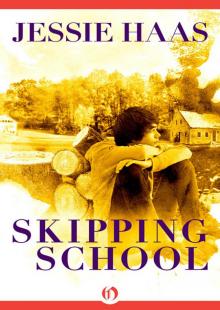 Skipping School
Skipping School Keeping Barney
Keeping Barney Unbroken
Unbroken Westminster West
Westminster West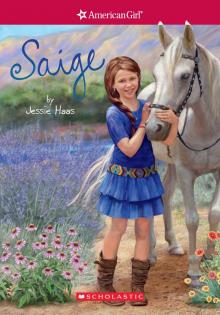 Saige
Saige Beware the Mare
Beware the Mare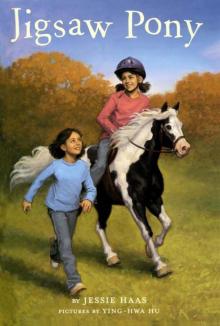 Jigsaw Pony
Jigsaw Pony Rescue
Rescue Saige Paints the Sky
Saige Paints the Sky Beware and Stogie
Beware and Stogie Chico's Challenge
Chico's Challenge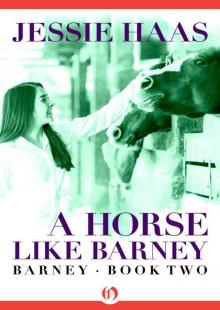 A Horse like Barney
A Horse like Barney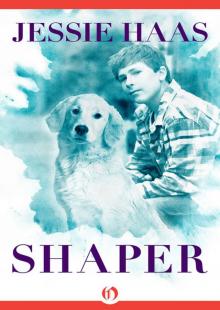 Shaper
Shaper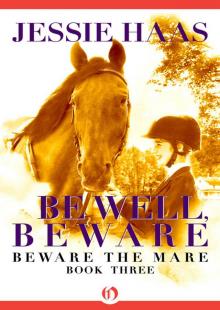 Be Well, Beware
Be Well, Beware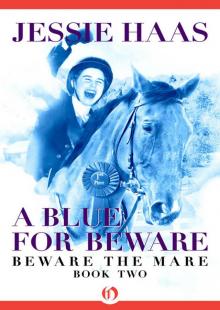 A Blue for Beware
A Blue for Beware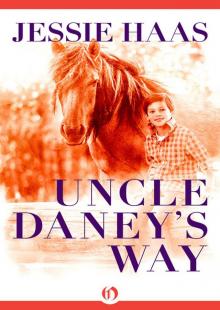 Uncle Daney's Way
Uncle Daney's Way